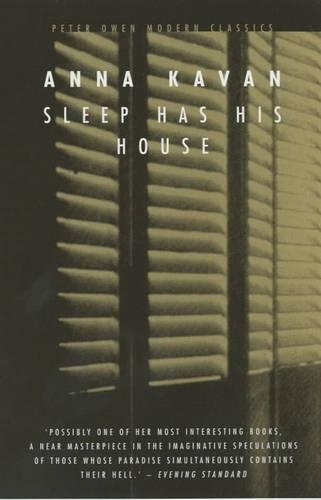
Sleep Has His House
(Paperback)
Publishing Details
Sleep Has His House
By (Author) Anna Kavan
Peter Owen Publishers
Peter Owen Publishers
23rd October 2002
United Kingdom
Classifications
General
Fiction
823.912
Physical Properties
Paperback
196
Description
A largely autobiographical account of an unhappy childhood, Sleep Has his House startled with its strangeness in 1948. Today it is one of Anna Kavan's most acclaimed books. A daring synthesis of memoir and surrealist experimentation, Sleep Has His House charts chronologically the stages of the subject's gradual withdrawal from all interest in and contact with the daylight world of received reality. Brief flashes of daily experience from childhood, adolescence and youth are described in what Kavan terms 'night-time language' - a heightened, decorative prose that frees these events from their gloomy associations. The novel suggests we have all spoken this dialect in childhood and in our dreams, but these thoughts can only be sharpened, or decoded by contemplation in the dark. Anna Kavan maintained that the plot of a book is only the point of departure, beyond which she tries to reveal that side of life which is never seen by the waking eye, but which dreams and drugs can suddenly illuminate. She spent the last ten years of her life literally and metaphorically shutting out the light; the startling discovery of Sleep Has His House is how much these night-time illuminations reveal her joy for the living world.
Reviews
"'Possibly one of her most interesting books, a near masterpiece in the imaginative speculations of those whose paradise simultaneously contains their hell.' - The Times; 'Anna Kavan's 'night-time language' is in no way obscure: on the contrary, her dreams are as carefully notated as paintings by Dali or de Chirico.' - New Statesman; 'Her dramas are haunted by a tall woman in black - her mother. There is also a revealing passage of an addict's sordid bedroom, littered with needles and spilled powders... Her writing is magnificent. It is a fascinating clinical casebook of her individual obsessions and the effects of drugs on her imagination... in the tradition of the great writers on drug literature, de Quincey, Wilkie Collins, Coleridge.' -Daily Telegraph; 'A testament of remarkable, if feverish beauty.' -Robert Nye, Guardian"
Author Bio
Anna Kavan was one of the greatest unsung enigmas in 20th-century British literature. Born as Helen Ferguson, who had a fraught childhood and two failed marriages led her to change her name to that of one of her characters. Despite struggling with mental illness and heroin addiction for most of her life, she was still able to write fiction that was as powerful and memorable as any English female writer of the last 150 years.
